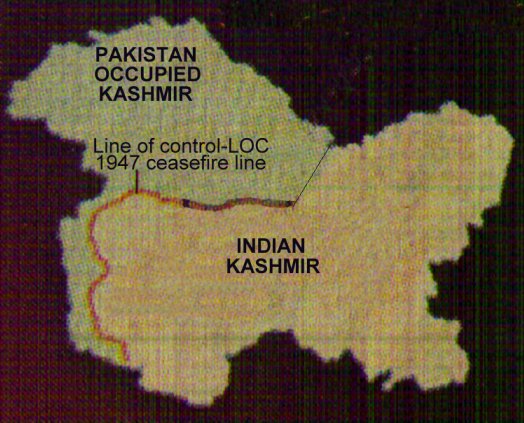Kashmiris observe `Black Day’ in Muzaffarabad
 Islamabad, Oct. 23 : Kashmiris from all walks of life observed a "Black Day" in Pakistan Kashmir, including capital Muzaffarabad, on Thursday on the occasion of the 62nd anniversary of the invasion of the area by Pakistani army men disguised as tribesmen from the North West Frontier of Province (NWFP), known as the Lashkars.
Islamabad, Oct. 23 : Kashmiris from all walks of life observed a "Black Day" in Pakistan Kashmir, including capital Muzaffarabad, on Thursday on the occasion of the 62nd anniversary of the invasion of the area by Pakistani army men disguised as tribesmen from the North West Frontier of Province (NWFP), known as the Lashkars.
A large number of people, carrying black flags and protest placards, participated in demonstrations held in various parts of Pakistan Kashmir.
Among the participants were Arif Shahid, the general secretary of the All Party National Alliance (APNA), Baltistan National Front leader Nawaz Khan Naji and Abdul Hamid Khan, the Chairman of Balawaristan National Front, besides others.
So vociferous were the protests by the almost 800-odd participants, that security forces deployed to ensure maintenance of law and order, had to use teargas shells and firing in the air to disperse them.
Some of them said that Jammu and Kashmir would never have been a subject of dispute had then newly created Pakistan not launched an "unprovoked tribal aggression against the Kashmiris" over six decades ago.
"This was an unprovoked aggression against the people, against the state of Jammu and Kashmir on the 22nd of October 1947," said Arif Shahid, general secretary of the All Party National Alliance (APNA), and added, it was important to recall "historical facts and put things in the right perspective."
For the last six decades, this region which Islamabad administers is has been subjected to the worst cases of human rights violations.
While successive governments in Pakistan have asserted that Kashmir's political future must be determined in accordance with the wishes of its people, yet its own constitutional provisions deny political choices to Kashmiris on its side with the exception of supporting its accession to Pakistan.
One unnamed leader of a Kashmir-based party claimed that authorities in Islamabad were only interested in occupying land in whichever way possible. He cited the recent decision of appointing a governor for the disputed area of Gilgit-Baltistan as proof of territorial acquisition.
India and Pakistan have fought two wars over Kashmir since gaining independence from British colonial rule in 1947. The dispute has now been further compounded by an increased activity from countries like China.
China has in recent years increased its presence in Gilgit Baltistan and in the Karakoram ranges in the pretext of carrying out developmental projects.
A recent report indicated a massive military build up of over 10,000 Chinese soldiers in the disputed region.
Meanwhile, the All Parties Hurriyat Conference (APHC) in Pakistan Kashmir has said that it will hold a peaceful sit-in and march on October 27. The sit-in and march would be held in front of the UN Military Observer Group in India and Pakistan (UNMOGIP) in Muzaffarabad to express solidarity with the people of Kashmir and to urge the world community to focus on the Kashmir problem.
A statement issued here on Thursday said that APHC would also present a memorandum on Kashmir to the UNMOGIP office Muzaffarabad. It maybe recalled that the tribal invasion of 1947 had resulted in nearly a third of the territory now known as Azad Jammu and Kashmir, or Pakistan-administered Kashmir, falling to the raiders before the then Maharaja (King) of Kashmir, Hari Singh, pleaded to India for help.
Indian troops were then airlifted into the Kashmir Valley on October 27, and they succeeded in blocking the tribal army''s advance beyond Baramulla District in the north of the Kashmir Valley. (ANI)